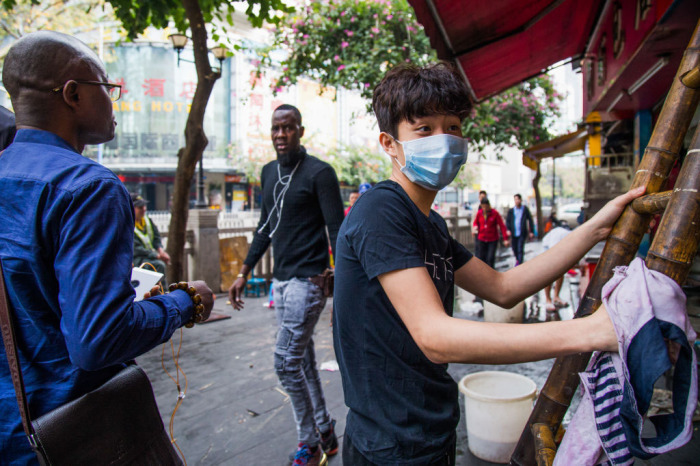US consulate warns Americans to avoid Chinese city terrorizing black people
McDonald’s apologizes for banning black people from entering restaurant in China

As a U.S. consulate has advised African Americans to stay away from the Chinese city of Guangzhou, where authorities have forced people of African origin out of their homes and hotels and denied them access to buy food in an alleged crackdown on “imported” coronavirus, a McDonald’s restaurant has apologized for banning black people from entering its restaurant.
“Black people are not allowed to enter,” said a sign displayed at a McDonald’s restaurant in the southern Guangzhou metropolitan area, according to numerous social media posts after Chinese officials alleged that the incidence of “imported coronavirus cases” was rising.
The sign is “not representative of our inclusive values” and has been removed, McDonald’s said in a statement to NBC News on Friday.
The restaurant has been temporarily shut down to “further educate managers and employees on our values, which includes serving all members of the communities in which we operate,” the fast-food chain added.
Taking note of a campaign against black people, the office of the U.S. Consulate General Guangzhou said the city “police ordered bars and restaurants not to serve clients who appear to be of African origin.”
It added, “Moreover, local officials launched a round of mandatory tests for COVID-19, followed by mandatory self-quarantine, for anyone with ‘African contacts,’ regardless of recent travel history or previous quarantine completion. African Americans have also reported that some businesses and hotels refuse to do business with them.”
China’s government denied that it has discriminated against “African brothers," despite mounting evidence disputing the regime's claims.
“All foreigners are treated equally,” a foreign ministry spokesman claimed, according to The U.K. Sunday Times. “We have zero tolerance for discrimination. The Chinese people always see in the African people partners and brothers through thick and thin. African friends can count on getting [a] fair, just, cordial and friendly reception in China.”
The spokesman blamed the U.S. for sowing “discord,” calling it “irresponsible and immoral.”
On social media in China, topics like a black man beating a nurse in Guangzhou and five Nigerians being tested positive for COVID-19 are trending.
Amid the reports of discrimination, the musician turned Ugandan presidential candidate Bobi Wine is planning a “humanitarian mission” to airlift black people out of China, the Times reported.
Wine plans to use private jets of his wealthy contacts for the mission. He also said that there are over a million Chinese people in Africa, “who are in most cases treated better than Africans.”
“Our priority is to restore our people’s dignity. This virus did not start in Africa so it is not right that Africans should be punished for it,” he added.
Nigerian activists are urging their government to intervene and warning China that its diplomatic relations with Nigeria could be at risk due to the discrimination, according to The Epoch Times.
“In Nigeria, we have a lot of Chinese. I don’t think you have ever received any information that the government of Nigeria go to their various houses and pick them for quarantine, so why are Africans and indeed Nigerians being targeted?” asked the Consul-General of the Nigerian High Commission in China, Anozie Maduabuchi Cyril. “We have European people here, people from America, Spain, and Italy and other countries, so why are you harassing them?”
There have been reports pointing to the responsibility of the Chinese Communist Party in putting millions of lives and the global economy at huge risk due to its lies about the coronavirus outbreak.
Cardinal Charles Bo of Myanmar recently called on China to apologize to the world and pay compensation for the damage caused. “There is one government that has primary responsibility for what it has done and what it has failed to do, and that is the CCP regime in Beijing,” the archbishop of the Roman Catholic Archdiocese of Yangon wrote in an op-ed published in UCA News.





























